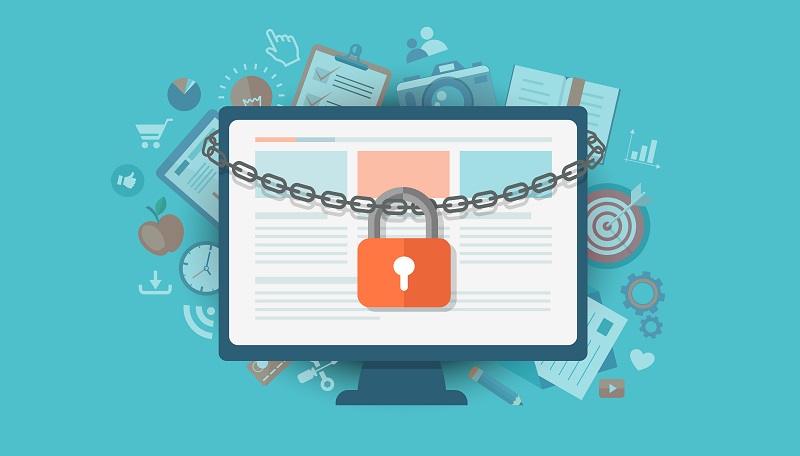Internet security is all about trusting at a distance. That is because you are dealing with everyone remotely, and are not able to confirm identity or authenticity in the traditional sense. CGS’s goal is to protect its data transactions and communication over the Internet made by all the end users while working at the office or away from the office.
While using the Internet, keep in mind that secure websites and pages will feature two important indicators that they are using encryption technology and a Secure Socket Layer. You will notice "https" (letter "s" after the http portion of the URL), which means that the server is a secure one. In your browser, you will also see a lock icon in the Security Status bar. The Security Status bar is located on the right side of the Address bar. The certificate that is used to encrypt the connection also contains information about the identity of the website owner or organization. You can click the lock to view the identity of the website.

Even if the connection between the computer and the website is secure, it does not guarantee that the website is trustworthy. Your privacy can still be compromised by the way the website uses or distributes your information, so you should read their Privacy Statement, which is generally available in a link from the website home page.
While there is no absolute guarantee of safety on the web, you can minimize online privacy or security problems by using websites you know and trust. Try to use sites you've used previously or that are recommended by trusted friends or family.
Using Public Computers
Sometimes you may need or want to use a computer when away from home or office. There are computer kiosks in almost every airport, hotel, library, and in many coffee shops, but beware when using public computers. Any computer that you do not own or has not been issued by an organization that you trust should be treated as if it is infected with viruses and other malicious programs, and therefore should never be trusted. If you must use a computer other than one issued by, or approved by, your company, follow these few simple rules:
- Never use public computers to make financial transactions or to enter personal information. Public computers may have programs that log keystrokes (key loggers), as well as other spyware that snatches sensitive information. Wait to make your Internet transactions until you get home.
- Always type in the full URL or verify the URL is correct if selected from search engine results. Hackers can redirect you to fake websites in order to steal or compromise your information.
- Disable the feature that stores login information and passwords. Uncheck the box on the login page so that no one can log in as you.
- Always log out of websites by clicking "log out" on the site. It's not enough to simply close the browser window or type in another address.
- Erase your tracks. Delete your temporary Internet files and your browsing history.
- Watch for over-the-shoulder snoops. When you use a public computer, be on the lookout for thieves who look over your shoulder or watch what you’re doing.
Using Public or Unsecured Wi-Fi
The recent explosion of free, public Wi-Fi has been an enormous boon for working professionals. Since these free access points are available at restaurants, hotels, airports, bookstores, and even random retail outlets, you are rarely more than a short trip away from access to your network, and your work. This freedom comes at a price, though, and few truly understand the risks associated with these public Wi-Fi connections. Learning how to protect yourself will ensure your important business data remains safe while you are trying to access your company portals via non company issued devices on public Wi-Fi.
- Use a VPN connection. A Virtual Private Network (VPN) works by encapsulating network traffic in an encrypted tunnel to a secure endpoint. Traffic is both encrypted and authenticated, rendering an attacker helpless to read or modify traffic.
- Require "https". Users should require all websites that send or receive personal information to use SSL. This includes your webmail. Many social media sites now offer SSL.
- Don't connect to unsecured wireless hotspots automatically; configure your computer not to automatically connect to a wireless network. This will prevent you from accidentally exposing private/confidential information, because you might think you are on a secure network when in fact you are not.
- Run a firewall program on your laptop. Firewalls guard against attack from other computers also connected to the unsecured network. You wouldn’t want someone connecting to your computer and possible downloading information from your hard drive.
- Ensure that your computer has virus and malware protection. If you don't install one, your computer is sure to pick up a virus/malware soon.
The more you know about how to make secure transactions when away from your home or office computer, the less likely it is you will encounter problems.
CGS has taken strong measures to ensure the security and safety of its operations, infrastructure, and data transactions. By staying alert to potential security threats and keeping in mind the suggestions listed above, you can help us keep our, and your, data and communication safe and secure. Follow these good practices and use the knowledge we've provided here, and you will be much more prepared to enjoy the conveniences of working away from office or home with peace of mind.
